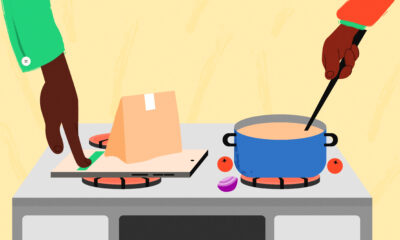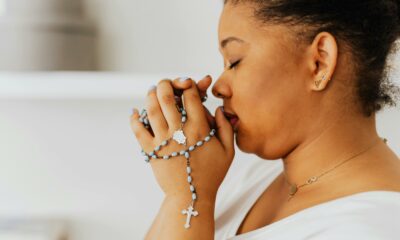Features
Uche Anichebe: Towards A Truly Democratic Nigeria
 Democracy is the bedrock of every civilized society. Little wonder that it is often expressed that the worse form of democracy is better than every form of authoritarian rule. As defined by Abraham Lincoln, it is the government of the people, for the people, and by the people. It is characterized by its dividends, which includes:
Democracy is the bedrock of every civilized society. Little wonder that it is often expressed that the worse form of democracy is better than every form of authoritarian rule. As defined by Abraham Lincoln, it is the government of the people, for the people, and by the people. It is characterized by its dividends, which includes:
Rule of law, separation of power, enfranchisement of the citizenry, fairness/ transparency in the electoral process, justice and equity, fundamental rights and peace
One may make the sweeping assertion that since most of the above mentioned democratic elements are present in Nigeria, then, it is within the rights of Nigeria to claim to be a democratic nation. The truth or fallacy of such claim is what this essay hopes to unveil.
NIGERIA AS A CASE STUDY
During Nigeria’s military regime, Chinua Achebe, the acclaimed father of African literature wrote the book The Trouble with Nigeria. In this book, the great author lamented the many oddities in Nigeria’s democracy, especially the corruption of the ruling class. In his words: “Nigeria is not a great country. It is one of the most disorderly places in the world. It is one of the most corrupt, insensitive, inefficient places under the sun. It is one of the most expensive countries …It is dirty, callous, noisy, ostentatious, dishonest and vulgar. In short it is among the most unpleasant places on earth!“
It must be kept in perspective that this book was written when Nigeria was still operating the military system of government. In analysing the Nigerian democracy, we must ask ourselves whether the past state of affairs is any different from the present.
According to the World Bank report in 2013, Nigeria is one of the countries where extreme poverty prevails. This is despite the plentiful natural resources she has at her disposal. Unemployment in Nigeria keeps rising at an alarming rate, while the government folds its hands and adopts a siddon look approach. Owing to poor infrastructure, mortality rate is on the increase. Our hospitals have become death zones, while privileged Nigerians resort to foreign medication and hospitalization. In 2009, we lost Gani Fawehinmi, one of our finest legal luminaries to the hands of faulty medical diagnosis. In the words of the UNICEF report on infant mortality, issued in the year 2012 ‘Nigeria (is) the second largest contributor of under- five and maternity mortality rate in the world…although many of these death are preventable, the quality of health care services in Nigeria continue to fail women and children’.
This is Nigeria, which according to the Transparency International report in 2012, is the 35th most corrupt nation in the world. The name Nigeria has become almost synonymous with corruption. Rather than go about its business of transforming the nation, political officers in Nigeria have carved for themselves, a new preoccupation, which is looting the nation’s treasury, and making a complete nonsense of the age long maxim of political science,’ ut ministraret, non ut sibi ministraretur- ‘to serve, and not to be served’. In the words of Prof. Chinua Achebe,’ the trouble with Nigeria is simply and squarely the failure of the leadership.
The Nigerian problem is the unwillingness or inability of the leaders to rise to the challenge of personal example which are the hallmarks of true leadership’
Again, this is Nigeria where almost all sectors are facing huge decline. Is it the education sector, with our poorly equip tertiary government owned institutions. Is it the agricultural sector, with our vast lands lying waste, while hunger ravishes the common man in Nigeria. Is it the power sector, which has remained grossly unreliable and epileptic for many decades. Is it our porous security sector which has snatched the lives of many innocent Nigerians owing to highway robbery, insurgency and of course, terrorism, as personified in the boko haram sect. The only sector that appears to be alive is the entertainment industry. But despite its flourish, many Nigerians are depressed, sad and miserable.
I once heard about a particular community in Nigeria, where armed robbers give prior ‘notice of visitation’ their prospective victims, warning them to prepare adequately for their operation, or face deadly consequences. I have also heard of another community where robbers attack at night to fill their hungry stomachs with whatever is left from the dinners of their innocent victims! These are not a new tales in Nigeria, and if they are anything to go by, they are symbolic representations of nagging poverty and deplorable state of our so called security.
In this present charade that we call democracy, there is at present, a huge divide between what is and what ought to be. The leadership has alienated itself from the masses. The election process has been thwarted by unscrupulous elements. The people are suffering. The roads are bad, and have become death arenas. In the midst of plenty, poverty is everywhere. The spirit of patriotism is no more. The future seems bleak for the common youth. Corruption is on an astronomical increase, while political deceit has become the stock in trade of the politicians. I read a recent report wherein the president of our country claimed that the GDP now stands at the tune of ….. Even the birds of the air are aware that these figures were fished out of a man’s wild imaginations. We certainly need no hebrew prophet to reveal to us the realistic and unreliable nature of these figures.
Towards a true Democratic Nation
The way forward lies in our hands. The first step bothers on a change in our orientation. The leaders must understand that political office is not an investment from which they will reap bountiful returns. Leadership is a call to national service. On the other hand, the followership must play the role of a watchdog. It must refuse to the temptation to take on the I- don’t -care attitude. If truth must be told, the common man has a greater stake in the wellbeing of our dear country, for it is he who feels the pinch of our underdevelopment and resultant hardship the most.
Again, sanity must be brought into the electoral system. The true test of democracy starts with the process of election. Is it free and fair? Do the leaders truly reflect the true will of the majority? These are fundamental questions in every democracy. To that extent, the freedom of the INEC from political interference must be guaranteed, and a free and fair election must be put in place, especially in the forth coming 2015 national and gubernatorial elections.
Furthermore, our federalism must be upheld. The levels of government must be made up of credible and trustworthy individuals who will be instrumental in the attainment of our national goals.
Conclusion
All nations, however perfect are in the state of becoming. This piece is not borne out of my penchant for criticism. No. It is a representation of my patriotism. I have highlighted the ills in Nigeria, with the hope that the change that we desire, will soonest be ours. I recognize that Nigeria is in a state of becoming. I also recognise that there is no nation without its own inadequacies and challenges. However, unless firm resolutions are made, our common dream will never be actualized. Unless we take the right step in the right direction, Nigeria will never have that true democracy that she deserves.























